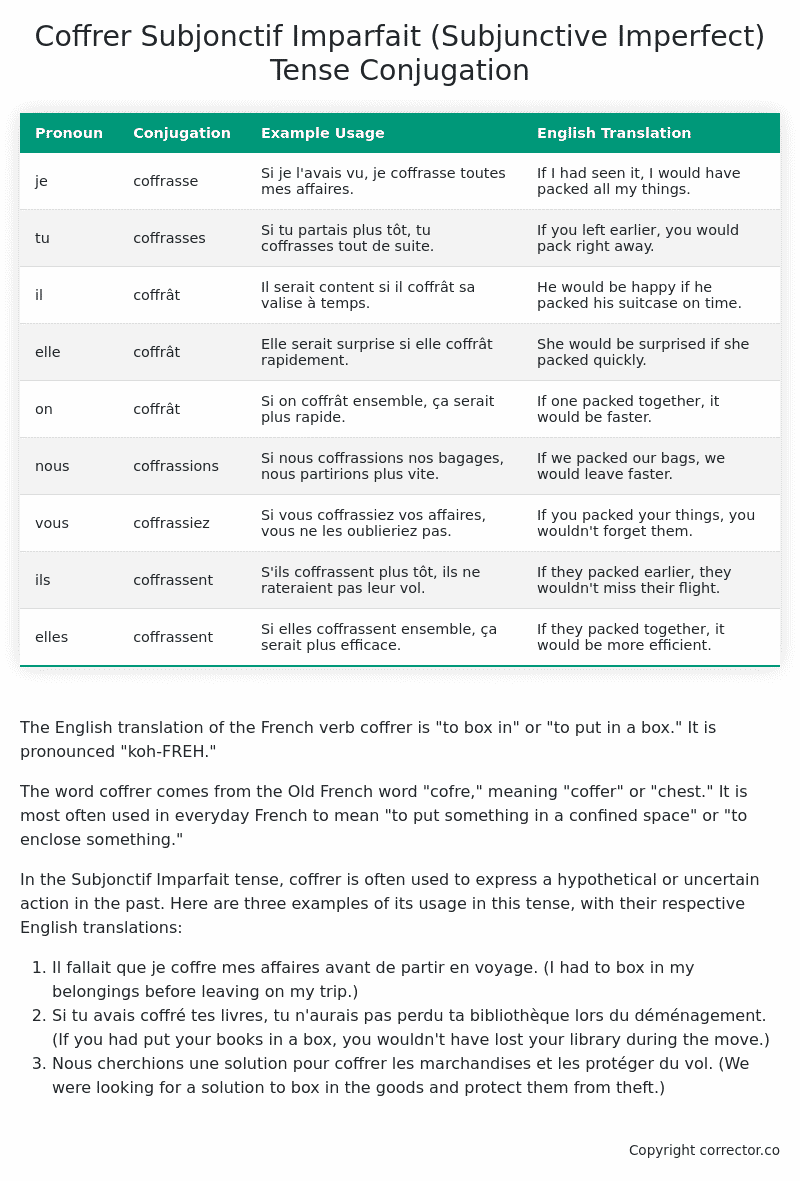Subjonctif Imparfait (Subjunctive Imperfect) Tense Conjugation of the French Verb coffrer
Introduction to the verb coffrer
The English translation of the French verb coffrer is “to box in” or “to put in a box.” It is pronounced “koh-FREH.”
The word coffrer comes from the Old French word “cofre,” meaning “coffer” or “chest.” It is most often used in everyday French to mean “to put something in a confined space” or “to enclose something.”
In the Subjonctif Imparfait tense, coffrer is often used to express a hypothetical or uncertain action in the past. Here are three examples of its usage in this tense, with their respective English translations:
- Il fallait que je coffre mes affaires avant de partir en voyage. (I had to box in my belongings before leaving on my trip.)
- Si tu avais coffré tes livres, tu n’aurais pas perdu ta bibliothèque lors du déménagement. (If you had put your books in a box, you wouldn’t have lost your library during the move.)
- Nous cherchions une solution pour coffrer les marchandises et les protéger du vol. (We were looking for a solution to box in the goods and protect them from theft.)
Table of the Subjonctif Imparfait (Subjunctive Imperfect) Tense Conjugation of coffrer
| Pronoun | Conjugation | Example Usage | English Translation |
|---|---|---|---|
| je | coffrasse | Si je l’avais vu, je coffrasse toutes mes affaires. | If I had seen it, I would have packed all my things. |
| tu | coffrasses | Si tu partais plus tôt, tu coffrasses tout de suite. | If you left earlier, you would pack right away. |
| il | coffrât | Il serait content si il coffrât sa valise à temps. | He would be happy if he packed his suitcase on time. |
| elle | coffrât | Elle serait surprise si elle coffrât rapidement. | She would be surprised if she packed quickly. |
| on | coffrât | Si on coffrât ensemble, ça serait plus rapide. | If one packed together, it would be faster. |
| nous | coffrassions | Si nous coffrassions nos bagages, nous partirions plus vite. | If we packed our bags, we would leave faster. |
| vous | coffrassiez | Si vous coffrassiez vos affaires, vous ne les oublieriez pas. | If you packed your things, you wouldn’t forget them. |
| ils | coffrassent | S’ils coffrassent plus tôt, ils ne rateraient pas leur vol. | If they packed earlier, they wouldn’t miss their flight. |
| elles | coffrassent | Si elles coffrassent ensemble, ça serait plus efficace. | If they packed together, it would be more efficient. |
Other Conjugations for Coffrer.
Le Present (Present Tense) Conjugation of the French Verb coffrer
Imparfait (Imperfect) Tense Conjugation of the French Verb coffrer
Passé Simple (Simple Past) Tense Conjugation of the French Verb coffrer
Passé Composé (Present Perfect) Tense Conjugation of the French Verb coffrer
Futur Simple (Simple Future) Tense Conjugation of the French Verb coffrer
Futur Proche (Near Future) Tense Conjugation of the French Verb coffrer
Plus-que-parfait (Pluperfect) Tense Conjugation of the French Verb coffrer
Passé Antérieur (Past Anterior) Tense Conjugation of the French Verb coffrer
Futur Antérieur (Future Anterior) Tense Conjugation of the French Verb coffrer
Subjonctif Présent (Subjunctive Present) Tense Conjugation of the French Verb coffrer
Subjonctif Passé (Subjunctive Past) Tense Conjugation of the French Verb coffrer
Subjonctif Imparfait (Subjunctive Imperfect) Tense Conjugation of the French Verb coffrer (this article)
Subjonctif Plus-que-parfait (Subjunctive Pluperfect) Tense Conjugation of the French Verb coffrer
Conditionnel Présent (Conditional Present) Tense Conjugation of the French Verb coffrer
Conditionnel Passé (Conditional Past) Tense Conjugation of the French Verb coffrer
L’impératif Présent (Imperative Present) Tense Conjugation of the French Verb coffrer
L’infinitif Présent (Infinitive Present) Tense Conjugation of the French Verb coffrer
Struggling with French verbs or the language in general? Why not use our free French Grammar Checker – no registration required!
Get a FREE Download Study Sheet of this Conjugation 🔥
Simply right click the image below, click “save image” and get your free reference for the coffrer Subjonctif Imparfait tense conjugation!

Coffrer – About the French Subjonctif Imparfait (Subjunctive Imperfect) Tense
Formation
Common Everyday Usage Patterns
Interactions with Other Tenses
Subjonctif Présent
Indicatif Passé Composé
Conditional
Conditional Perfect
Summary
I hope you enjoyed this article on the verb coffrer. Still in a learning mood? Check out another TOTALLY random French verb conjugation!


